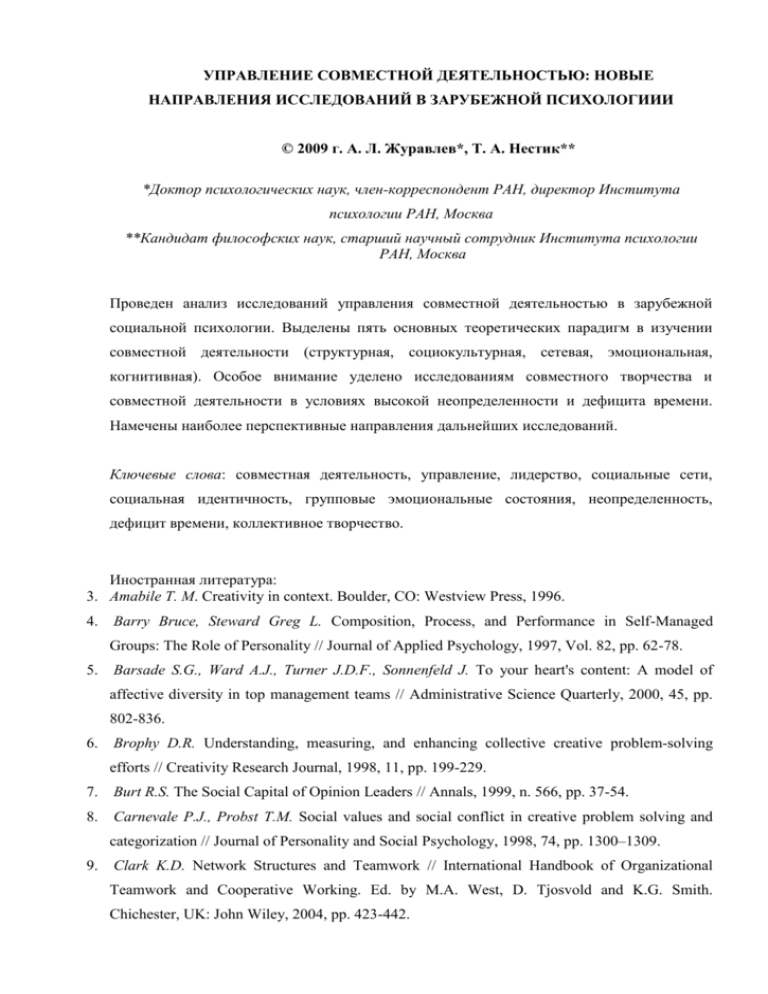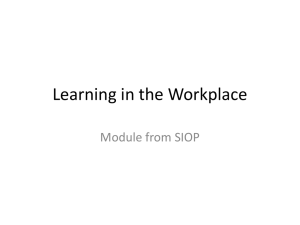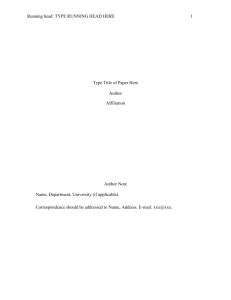новые направления исследований в зарубежной психологиии
advertisement

УПРАВЛЕНИЕ СОВМЕСТНОЙ ДЕЯТЕЛЬНОСТЬЮ: НОВЫЕ НАПРАВЛЕНИЯ ИССЛЕДОВАНИЙ В ЗАРУБЕЖНОЙ ПСИХОЛОГИИИ © 2009 г. А. Л. Журавлев*, Т. А. Нестик** *Доктор психологических наук, член-корреспондент РАН, директор Института психологии РАН, Москва **Кандидат философских наук, старший научный сотрудник Института психологии РАН, Москва Проведен анализ исследований управления совместной деятельностью в зарубежной социальной психологии. Выделены пять основных теоретических парадигм в изучении совместной деятельности (структурная, социокультурная, сетевая, эмоциональная, когнитивная). Особое внимание уделено исследованиям совместного творчества и совместной деятельности в условиях высокой неопределенности и дефицита времени. Намечены наиболее перспективные направления дальнейших исследований. Ключевые слова: совместная деятельность, управление, лидерство, социальные сети, социальная идентичность, групповые эмоциональные состояния, неопределенность, дефицит времени, коллективное творчество. Иностранная литература: 3. Amabile T. M. Creativity in context. Boulder, CO: Westview Press, 1996. 4. Barry Bruce, Steward Greg L. Composition, Process, and Performance in Self-Managed Groups: The Role of Personality // Journal of Applied Psychology, 1997, Vol. 82, pp. 62-78. 5. Barsade S.G., Ward A.J., Turner J.D.F., Sonnenfeld J. To your heart's content: A model of affective diversity in top management teams // Administrative Science Quarterly, 2000, 45, pp. 802-836. 6. Brophy D.R. Understanding, measuring, and enhancing collective creative problem-solving efforts // Creativity Research Journal, 1998, 11, pp. 199-229. 7. Burt R.S. The Social Capital of Opinion Leaders // Annals, 1999, n. 566, pp. 37-54. 8. Carnevale P.J., Probst T.M. Social values and social conflict in creative problem solving and categorization // Journal of Personality and Social Psychology, 1998, 74, pp. 1300–1309. 9. Clark K.D. Network Structures and Teamwork // International Handbook of Organizational Teamwork and Cooperative Working. Ed. by M.A. West, D. Tjosvold and K.G. Smith. Chichester, UK: John Wiley, 2004, pp. 423-442. 10. Collins M.A., Amabile T.M. Motivation and creativity // Handbook of creativity. R. J. Sternber (Ed.). New York: Cambridge University Press, 1999, pp. 297-312. 11. Cross R., Prusak L. The People Who Make Organizations Go or Stop // Harvard Business Review, 2002, Vol. 80, n. 6, pp. 104-112. 12. Deal T.E., Kennedy A. Corporate cultures: The rites and rituals of corporate life. Reading, MA: Addison-Wesley, 1982 13. Den Hartog D.N., House R.J., Hanges P.J., Ruiz-Quintanilla S.A., Dorfman P.W., other Globe Country Investigators. Culture specific and cross-culturally generalizable implicit leadership theories: Are attributes of charismatic/transformational leadership universally endorsed? // Leadership Quarterly, 1999, 10, pp. 219–256 14. Diehl M., Stroebe W. Productivity loss in brainstorming groups: Toward the solution of a riddle // Journal of Personality and Social Psychology, 1987, 53, pp. 497–509. 15. Feyerherm Ann E., Rice Cheryl L. Emotional intelligence and team performance: The good, the bad and the ugly // International Journal of Organizational Analysis, 2002, Vol. 10, Issue 4, pp. 343-362. 16. George J.M. Group affective tone // Handbook of work group psychology. M.A. West (Ed.). Chichester: John Wiley, 1996, pp. 77–94. 17. Gevers J.M.P., van Eerde W., Rutte Chr. G. Time pressure, potency, and progress in project groups // European Journal of group and organizational psychology, 2001, Vol. 10 (2), pp. 205– 221, pp. 206-207. 18. Goleman D. What makes a leader? // Harvard Business Review, 1998, November-December, pp. 93-102. 19. Goleman D., Boyatzis R, McKee A. Primal leadership. Learning to lead with emotional intelligence. Boston: Harvard Business School Press, 2002. 20. Gruenfeld D.H., Mannix E.A., Williams K.Y., Neale M. A. Group composition and decisionmaking: How member familiarity and information distribution affect process and performance // Organizational Behavior and Human Decision Processes, 1996, 67, pp. 1-15 21. Guzzo R.A., Dickson M.W. Teams in organizations: Recent research on performance and effectiveness // Annual Review of Psychology, 1996, 47, pp. 307–338 22. Haslam A. Psychology in Organizations: The Social Identity Approach. Thousand Oaks, California: Sage Publications, 2000. 23. Hatfield E., Cacioppo J.T., Rapson R. Emotional Contagion. N.Y.: Cambridge University Press, 1994. 24. Hayes R.A. and W. J. Abernathy Managing Our Way to Economic Decline // Harvard Business Review, 1980, July–August, pp. 67–77 25. Hinsz V.B. Cognitive and consensus processes in group recognition: Memory performance // Journal of Personality and Social Psychology, 1990, Vol. 59, pp. 705-718. 26. Hogg M.A., Hardie E.A., Reynolds K.J. Prototypical similarity, self-categorization, and depersonalized attraction: A perspective on group cohesiveness // European Journal of Social Psychology, 1995, 25, pp. 159-177 27. House R.J. Leadership in the 21st century: A speculative enquiry // The changing nature of work. A. Howard (Ed.). San Francisco: Jossey Bass, 1995. 28. House R.J., Wright N.S., Aditya R.N. Cross-cultural research on organizational leadership: A critical analysis and a proposed theory // New perspectives in international organizational psychology. P.C. Early & M. Erez (Eds). San Francisco: New Lexington, 1997, pp. 535–625. 29. Huxham Chris. Theorizing collaboration practice // Public Management Review, 2003, Vol. 5, Issue 3, pp. 401-423. 30. James K. Goal conflict and originality of thinking // Creativity Research Journal, 1995, 8, pp. 285–290. 31. Jehn K.A. A qualitative analysis of conflict types and dimensions in organizational groups // Administrative Science Quarterly, 1997, 42, pp. 530–557. 32. Jordan P.J., Troth A.C. Managing Emotions During Team Problem Solving // Human Performance, 2004, Vol. 17, Issue 2, pp. 195-218. 33. Kalish Yuval. Bridging in social networks: Who are the people in structural holes and why are they there? // Asian Journal of Social Psychology, 2008, Vol. 11, Issue 1, pp. 53-66. 34. Karau S.J., Kelly J.R. The effects of time scarcity and time abundance on group performance quality and interaction process // Journal of Experiential Social Psychology, 1992, 28(6), pp. 542–571. 35. Kelly J.R. Mood and emotion in groups // Group Processes. Blackwell Handbook of Social Psychology. Ed. By M.A. Hogg and S. Tindale. London: Blackwell Publishing, 2003, pp. 164181. 36. Kelly J.R., Futoran G.C., McGrath J.E. Capacity and capability: seven studies of entrainment of task performance rates // Small Group Research, 1990, 21(3), pp. 283–314. 37. Kelly J.R., Karau S.J. Entrainment of creativity in small groups // Small Group Research, 1993, 24(2), pp. 179–198. 38. Kelly Janice R., Karau Steven J. Group Decision Making: The Effect of Initial Preferences and Time Pressure // Personality & Social Psychology Bulletin, 1999, Vol. 25, n. 11, pp. 1342-1354. 39. Kerr Norbert L., Tindale R. Scott. Group performance and decision making // Annual Review of Psychology, 2004, Vol . 55, pp. 623–655. 40. Kirton M. Adaptors and innovators: Styles of creativity an problem-solving. New York: Routledge, 1989. 41. Kruglanski A.W., Webster D.M. Motivated closing of the mind: “seizing” and “freezing.” // Psychological Review, 1996, 103(2), PP.. 263–283. 42. Kurtzberg Terri R. Feeling Creative, Being Creative: An Empirical Study of Diversity and Creativity in Teams // Creativity Research Journal, 2005, Vol. 17 Issue 1, pp. 51-65. 43. Kurtzberg Terri R., Amabile Teresa M. From Guilford to Creative Synergy: Opening the Black Box of Team-Level Creativity // Creativity Research Journal, 2000–2001, Vol. 13, Nos. 3 & 4, pp. 285–294 44. Lord R., Maher K.J. Leadership and information processing: Linking perceptions and performance . Boston: Unwin-Everyman, 1991 45. Maier Cunter W., Prange Christiana, von Rosenstiel Lutz. Psychological Perspectives of Organizational Learning // Handbook of Organizational Learning and Knowledge. Ed. by Meinolf Dierkes, Ariane Berthoin Antal, John Child, and Ikujiro Nonaka. Oxford, 2001, pp. 1434. 46. McGuire M. Managing Networks: Propositions on What Managers Do and Why They Do It // Public Administration Review, 2002, Vol. 62, n. 5, pp. 599-609. 47. McIntosh D.N., Druckman D., Zajonc R.B. Socially induced affect // Learning, remembering, believing: Enhancing human performance. Druckman, D. and Bjork R. (Eds.). Washington, DC, 1994, pp. 251-276. 48. Nemeth C. J. Dissent as driving cognition, attitudes, and judgments // Social Cognition, 1995, 13, pp. 273–291. 49. Nonaka Ikujiro. A dynamic theory of organizational knowledge creation // How Organizations Learn. Managing the Search for Knowledge. Ed. by Ken Starkey, Sue Tempest and Alan McKinlay. 2nd ed., London: Thomson, 2004, pp. 165-201 50. Pelled L.H. Demographic diversity, conflict, and work group outcomes: An intervening process theory // Organization Science, 1996, 6, pp. 207-229 51. Peters T., Waterman R. In search of excellence. San Francisco: Harper & Row, 1982 52. Pierro A., Mannetti L., De Grada E., Livi S., Kruglanski A.W. Autocracy bias in informal groups under need for closure // Personality and Social Psychology Bulletin, 2003, 29(3), pp. 405–417. 53. Prichard Jane S., Stanton Neville A. Testing Belbin's team role theory of effective groups // Journal of Management Development, 1999, Vol. 18, Issue 7/8, pp. 652-665 54. Ridgeway Cecilia L. Social Status and Group Structure // Group Processes. Blackwell Handbook of Social Psychology. Ed. By M.A. Hogg and S. Tindale. London: Blackwell Publishing, 2003, pp. 352-375 55. Sadler Philip. Leadership and Organizational Learning // Handbook of Organizational Learning and Knowledge. Ed. by Meinolf Dierkes, Ariane Berthoin Antal, John Child, and Ikujiro Nonaka. Oxford, 2001, pp. 415-427. 56. Sapsed Jonathan, Bessant John, Partington David, Tranfield David, Young Malcolm. Teamworking and knowledgemanagement: a review of converging themes // International Journal of Management Reviews, 2002, Volume 4, Issue 1, pp. 71–85 57. Senior B. Team roles and team performance: Is there really a link? // Journal of Occupational and Organizational Psychology, 1997, Vol. 70, pp. 241-258. 58. Sinclair R.C., Mark M.M. The influence of mood state on judgment and action // The Construction of Social Judgments. Ed. by M.M. Martin & A. Tesser. Hillsdale, NJ: Erlbaum, 1992, pp. 165-193. 59. Smith E.R, Murphy J., Coats S. Attachment to groups: theory and measurement // Journal of Personality and Social Psychology, 1999, 77, pp. 94-110. 60. Tyler T.R. Why people cooperate with organizations: an identity-based perspective // Research in Organizational Behavior, 1999, Vol. 21, pp. 201-245 61. Weiss H.M., Cropanzano K. Affective events theory: A theoretical discussion of the structure, causes, and consequences of affective experiences at work // Research in Organizational Behavior, 1996, Vol. 18, pp. 1-74. 62. Wenger E.C., Snyder W.M. Communities of Practice: the Organizational Frontier // Harvard Business Review, January-February 2000, pp. 139-145.




